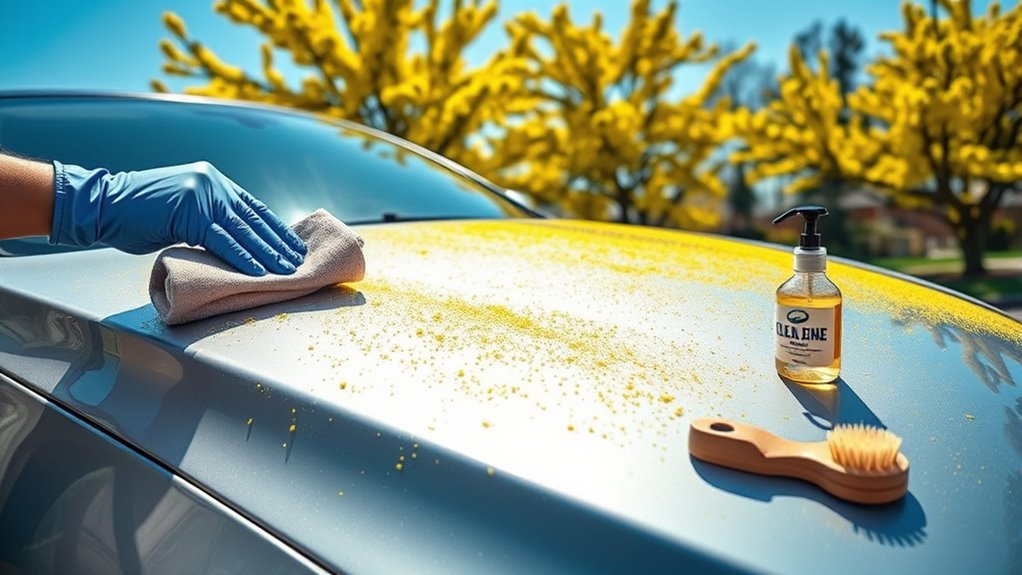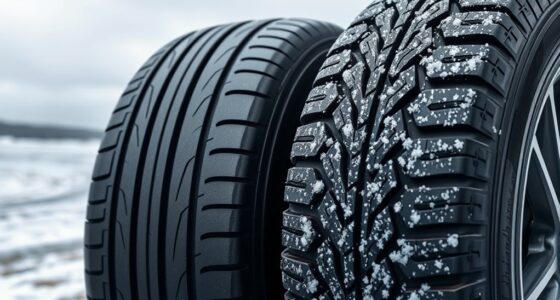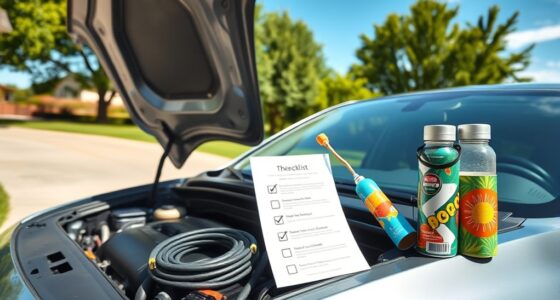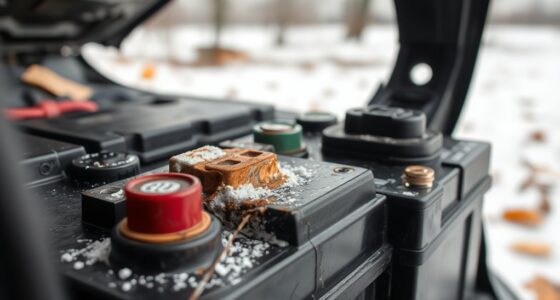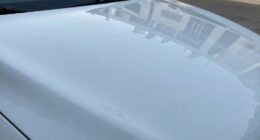To prepare your car for pollen season, give it a thorough wash using gentle soap and microfiber cloths, paying attention to crevices and headlights. Maintain your air filtration system by replacing filters regularly, and consider using allergen-reducing options. Applying a protective wax helps create a barrier against pollen, while parking in shaded areas reduces buildup. For more tips on keeping your vehicle clean and protected, continue exploring effective strategies.
Key Takeaways
- Regularly wash your car with gentle soap and microfiber cloths to remove pollen buildup.
- Replace or clean the cabin air filter to improve indoor air quality during pollen season.
- Apply a protective wax or sealant to create a barrier against pollen and dirt.
- Park in shaded areas or garages to minimize pollen adhesion and sun damage.
- Maintain routine exterior cleaning and avoid harsh brushes to preserve paint and finish.
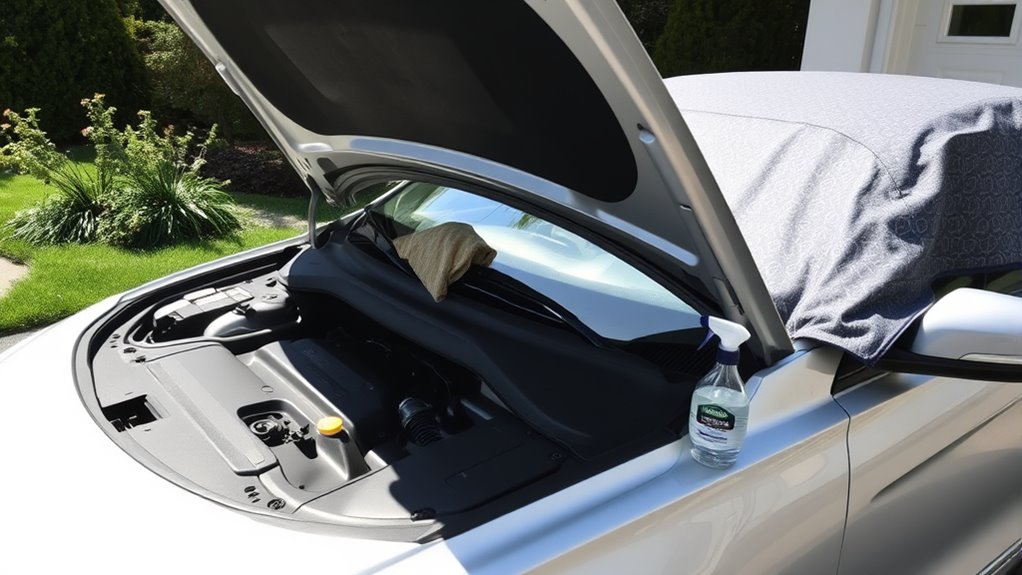
As pollen season approaches, it is essential to prepare your car to keep it clean and prevent damage. Pollen can quickly accumulate on your vehicle’s exterior, leading to stubborn stains and potential paint damage if not properly managed. To start, give your car a thorough exterior cleaning. Use a gentle car wash soap and a soft sponge or microfiber cloth to remove loose pollen, dirt, and debris from the surface. This step not only improves the appearance but also reduces the risk of pollen scratching the paint when you clean later or when you’re on the road. Pay special attention to the grille, headlights, and crevices where pollen tends to settle. Rinse thoroughly to make sure all pollen residues are gone, and dry the vehicle with a clean microfiber towel to prevent water spots. Regular cleaning helps maintain the paint’s protective layer and prevents pollen from causing long-term damage.
Beyond exterior cleaning, focusing on your car’s air filtration system is equally important. Your vehicle’s cabin air filter plays a critical role in maintaining air quality inside the car, especially during pollen season. A clogged or dirty filter can allow pollen and other allergens to circulate freely inside, aggravating allergies and reducing air quality. Check your vehicle’s manual to find out how often your air filter should be replaced or cleaned during pollen season. Replacing the filter with a high-quality allergen-reducing option can considerably improve the air you breathe while driving. This step makes sure that pollen doesn’t build up inside your car’s ventilation system, helping you breathe easier and stay comfortable during your commutes.
In addition to cleaning and air filtration, consider applying a protective wax or sealant to your car’s exterior. This creates a barrier that makes it easier to wash off pollen and dirt in the future. Regularly washing your car during pollen season is essential, ideally every one to two weeks, to prevent buildup. When washing, avoid using harsh brushes or sponges that could scratch the paint, especially when pollen is embedded in dirt. Instead, opt for a gentle touch and spot clean any stubborn areas. Also, try to park your car in a garage or shaded spot whenever possible, as direct sunlight can cause pollen to stick more stubbornly and lead to quicker paint fading. Additionally, understanding the importance of vehicle maintenance can help extend your car’s life and keep it looking its best year-round.

Rain-X 620191 Foaming Car Wash – 100 fl oz. High-Foaming, Concentrated Formula For Greater Cleaning Action, Safely Lifting Dirt, Grime And Residues For An Exceptional Clean
Reduces Spots And Streaks – Rain-X Foaming Car Wash Soap Visibly Reduces Spots And Streaks For A High…
As an affiliate, we earn on qualifying purchases.
As an affiliate, we earn on qualifying purchases.
Frequently Asked Questions
How Can I Prevent Pollen From Entering My Car Through the Vents?
To prevent pollen from entering your car through the vents, start by sealing your air vents with vent sealing covers or adjustable vent covers. Additionally, install high-quality air vent filters designed to trap pollen particles. Regularly replace these filters to maintain their effectiveness. Keep your windows closed when possible, especially during peak pollen times, and use recirculation mode on your AC to reduce outside air intake.
Are There Specific Cleaning Products Recommended for Pollen Removal?
You should use an all-purpose cleaner and a microfiber cloth for pollen removal. Spray the all-purpose cleaner onto the microfiber cloth and gently wipe down your car’s interior surfaces, including vents and dashboard. For exterior pollen, wash your car with a high-quality car wash soap and rinse thoroughly. Regular cleaning helps prevent pollen buildup, keeping your car cleaner and your air fresher during pollen season.
How Often Should I Replace My Car’s Cabin Air Filter During Pollen Season?
During pollen season, you should replace your car’s cabin air filter every 15,000 to 20,000 miles, or roughly once a year. Regular air filter maintenance guarantees pollen filter replacement happens before buildup causes poor air quality inside your vehicle. Check your owner’s manual for specific recommendations, but don’t wait too long—timely pollen filter replacement helps keep the air inside fresh and free of allergens.
Can Using a Car Cover Help Reduce Pollen Buildup?
Using a car cover can definitely help reduce pollen buildup on your vehicle. The benefits of a car cover include acting as a barrier against pollen, dirt, and debris, making it easier to keep your car clean. It also enhances pollen resistance strategies by protecting your paint and interior from pollen exposure. Regularly using a cover during pollen season keeps your car cleaner and minimizes the amount of pollen that settles on it.
What Are the Signs That Pollen Is Affecting My Car’s Paint or Interior?
You’ll notice paint damage if you see a dull, chalky film or tiny scratches that seem to worsen with time. Interior staining appears as yellowish or greenish spots on your seats, dashboard, or carpets, especially after exposure to pollen. If you observe these signs, it’s a clear indication that pollen is affecting your car’s paint and interior, and you should take action to clean and protect your vehicle.
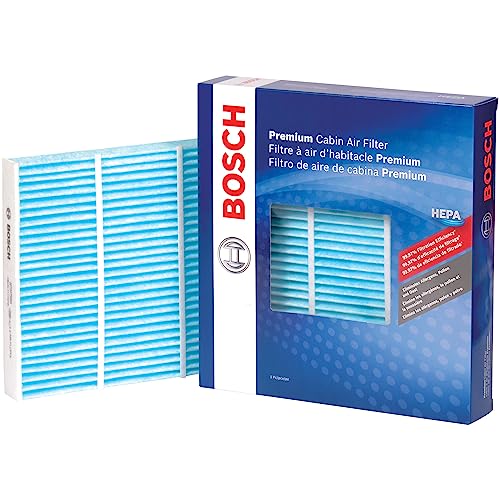
BOSCH 6091C HEPA Cabin Air Filter – Compatible with Select Buick Enclave, Encore GX; Cadillac XT4, XT5; Chevrolet Camaro, Cruze, Impala, Malibu, Silverado, Traverse; GMC Sierra, Terrain, Yukon + More
Bosch HEPA Premium Cabin Air Filters are designed and tested to meet High Efficiency Particulate Air (HEPA) standards…
As an affiliate, we earn on qualifying purchases.
As an affiliate, we earn on qualifying purchases.
Conclusion
Just like a knight prepares his armor before battle, get your car ready for pollen season. Regular cleaning, changing filters, and sealing vents are your shield against the sneezing onslaught. By taking these simple steps, you’ll keep your vehicle fresh and your drives enjoyable—no need to summon the patience of Sisyphus. Stay proactive, and you’ll breeze through pollen season with the confidence of a hero in their quest, not a victim of nature’s pranks.
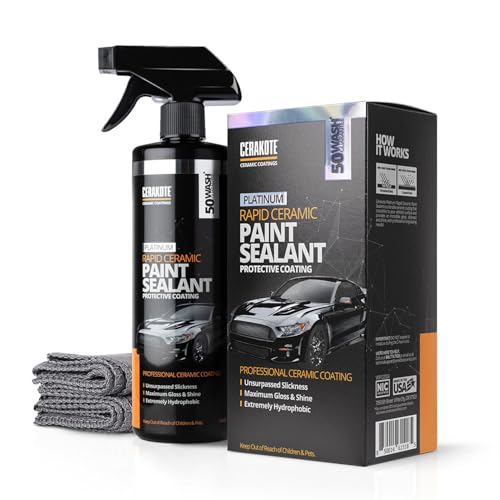
CERAKOTE® Platinum Rapid Ceramic Paint Sealant Spray – 14 oz. – 50 Wash Rating – Maximum Gloss & Shine – Extremely Hydrophobic – Unmatched Slickness – Ceramic Spray Coating
Industry Leading 50 Wash Rating – We’ve taken our top performing paint sealant and made it even better….
As an affiliate, we earn on qualifying purchases.
As an affiliate, we earn on qualifying purchases.

USANOOKS Microfiber Cleaning Cloth Grey – 12 Pcs (12.5"x12.5") – High Performance – 1200 Washes, Ultra Absorbent Microfiber Towel Weave Grime & Liquid for Streak-Free Mirror Shine – Car Washing Cloth
10x GRIP-ROOT WEAVE – TRAP MORE, WORK LESS: Ultra-absorbent microfiber towels for car Grip Root weave works like…
As an affiliate, we earn on qualifying purchases.
As an affiliate, we earn on qualifying purchases.
